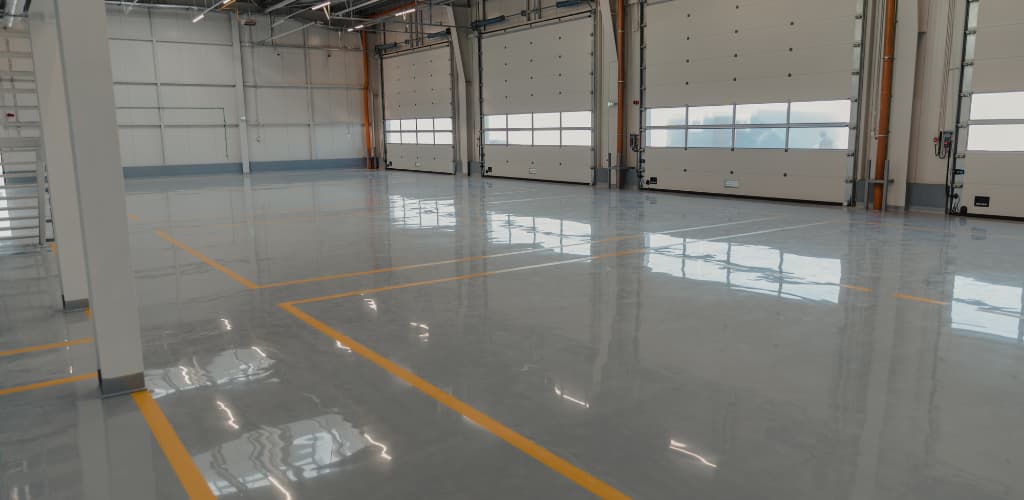Introduction
In the world of industrial flooring, the choice between epoxy and traditional flooring is a crucial one. Industrial clients understand that the type of flooring they install can significantly impact safety, productivity, and maintenance costs. This article will delve into the key differences between epoxy and traditional flooring, highlighting why industrial clients overwhelmingly choose epoxy for their facilities. Let’s explore these factors in detail.
Epoxy Vs. Traditional Flooring: Why Industrial Clients Choose Epoxy
The Durability Factor
When it comes to industrial environments, durability is paramount. Epoxy flooring is renowned for its exceptional durability, making it an ideal choice for heavy machinery and high-traffic areas. Unlike traditional flooring, which may crack or wear down over time, epoxy can withstand the toughest conditions, ensuring longevity and cost-effectiveness.
Epoxy’s incredible durability is derived from its chemical composition, which creates a solid, seamless surface that resists wear and tear. This feature alone is a compelling reason why industrial clients opt for epoxy over traditional flooring options.
Maintenance Made Easy
Industrial facilities are busy places, and downtime for maintenance can be costly. Epoxy flooring simplifies this aspect with its low-maintenance characteristics. Unlike traditional flooring, which may require frequent waxing, polishing, or resealing, epoxy flooring is easy to clean and maintain.
Its non-porous surface prevents liquids and chemicals from seeping into the floor, making cleanup a breeze. This easy maintenance translates to significant time and cost savings, which is music to the ears of industrial clients.
Enhanced Safety
Safety is a top priority in industrial settings, and epoxy flooring, with its concrete coating, can significantly contribute to a safer work environment. Epoxy is resistant to slippage, even when wet, which is crucial in facilities where spills are common. This feature reduces the risk of workplace accidents, making it an appealing choice for industrial clients concerned about employee safety.
Traditional flooring, on the other hand, may become slippery when wet, posing a potential hazard to workers. The safety benefits of epoxy are a key reason why industrial clients choose it over traditional options.
Customization and Aesthetics
Industrial clients are increasingly recognizing the value of aesthetics in their facilities. Epoxy flooring offers a wide range of customization options, allowing clients to choose colors, and patterns, and even incorporate their company logo into the flooring design.
Traditional flooring options are typically limited in terms of aesthetics. Epoxy’s ability to be tailored to the client’s branding and design preferences is a significant selling point for many industrial clients.
Environmentally Friendly
In today’s world, environmental responsibility is a priority. Epoxy flooring is considered more eco-friendly compared to many traditional options. It can be installed directly over existing concrete floors, reducing the need for additional materials and minimizing waste. Epoxy’s longevity also means fewer replacements, further reducing its environmental footprint.
Industrial clients who value sustainability and eco-friendliness often lean towards epoxy flooring for these reasons.
Cost-Efficiency
Epoxy flooring, while initially requiring an investment, offers long-term cost savings. Its durability, low maintenance requirements, and resistance to damage translate into reduced replacement and repair costs.
Traditional flooring may appear cheaper upfront, but when the long-term expenses are considered, epoxy becomes the more cost-efficient choice. Industrial clients appreciate the financial benefits of epoxy.
Enhanced Productivity
Industrial clients understand that time is money. Epoxy flooring can be installed relatively quickly compared to many traditional flooring options, reducing downtime. Additionally, its seamless surface is easier to navigate for forklifts and other machinery, which can enhance productivity.
The efficiency and speed of epoxy installation, coupled with improved workflow, contribute to higher productivity levels for industrial clients.
FAQs
Q: What is the main difference between epoxy and traditional flooring?
Epoxy flooring is a highly durable, seamless, and easy-to-maintain option, while traditional flooring is often less durable and requires more maintenance.
Q: Are there any downsides to epoxy flooring?
Epoxy flooring can be more expensive initially, and it may require professional installation.
Q: Can epoxy flooring be customized to match the facility’s branding?
Yes, epoxy flooring offers a wide range of customization options, including colors, patterns, and the incorporation of logos.
Q: How does epoxy flooring contribute to a safer work environment?
Epoxy flooring is slip-resistant, even when wet, reducing the risk of workplace accidents.
Q: Is epoxy flooring environmentally friendly?
Yes, epoxy flooring is considered more eco-friendly due to its low material waste and reduced need for replacements.
Q: Is epoxy flooring more expensive than traditional options in the long run?
While epoxy flooring may have a higher initial cost, its durability and low maintenance make it cost-effective over time.
Conclusion
In the battle of Epoxy Vs. Traditional Flooring, industrial clients are increasingly choosing epoxy for its exceptional durability, low maintenance requirements, enhanced safety features, customization options, eco-friendliness, cost-efficiency, and positive impact on productivity. These factors, along with the ease of installation, make epoxy the top choice for industrial clients looking to create a safe, efficient, and visually appealing work environment.


